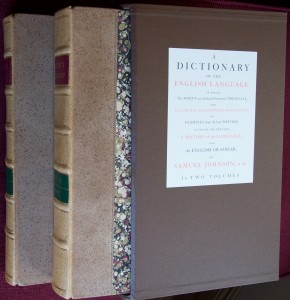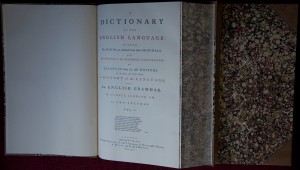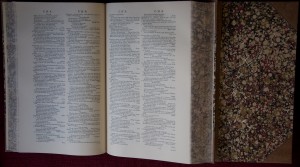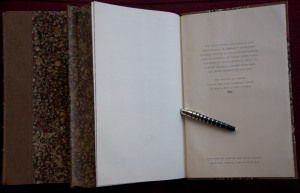“It is the fate of those who toil at the lower employments of life, to be rather driven by fear of evil, than attracted to the prospect of good; to be exposed to censure, without hope of praise; to be disgraced by miscarriage, or punished for neglect, where success would have been without applause, and diligence without reward…Among these unhappy mortals is writer of dictionaries…Every other authour may aspire to praise; the lexicographer can only hope to escape reproach, and even this negative recompense has been yet granted to very few.” So says Samuel Johnson in the preface to his famous dictionary of the English Language, published in 1755.
Indeed, a dictionary may not seem very exciting at all in these days of the internet and computers. How easy is it to just google a word and choose from numerous on-line dictionaries? I do it all the time. But when I am in the comfort of my office, the wonderful Folio Society facsimile of the first edition of Johnson’s Dictionary is often where I look first. Johnson claims “no dictionary of a living tongue ever can be perfect, since while it is hastening to publication, some words are budding, and some falling away” but this one comes close for me. The definitions may be close to 300 years old but lots of them still apply, and some of them are downright hilarious as Johnson’s personality creeps into the book. And the Folio Society edition is fabulous!
This is a big dictionary: two volumes that are each 16.25”h x 10.25”l x 3.25”w and together with the slip case weigh in at a hefty 28 pounds. They are beautifully done with hand-marbled paper sides three quarter bound in blind-tooled mottled calf leather with leather labels in gold. The hand-marbling was done by the late Anne Muir. I’m a nut for marbled papers and this book is a dream for me as she didn’t stop at the paper for the boards but employed edge marbling to the text block as well. In fact, the marbling was one of the primary attractions and reason for me to acquire the book as I don’t usually go in for reference works. Now I find myself pulling it out often. Going back to his preface, Mr. Johnson states:
A large work is difficult because it is large, even though all its parts might singly be performed with facility; where there are many things to be done, each must be allowed its share of time and labour, in the proportion only which it bears to the whole; nor can it be expected, that the stones which form the dome of a temple, should be squared and polished like the diamond of a ring.
I think he’d be proud to see this edition sitting on his desk, as it is indeed a gem.
In the preface, Dr. Johnson goes on to make many statements regarding the mutability of language and the challenges of a lexicographer:
The words which our authours have introduced by their knowledge of foreign languages, or ignorance of their own, by vanity or wantonness, by compliance with fashion, or lust of innovation, I have registered as they occurred, though commonly only to censure them, and warn others against the folly of naturalizing useless foreigners to the injury of the natives.
If of these the whole power is not accurately delivered, it must be remembered, that while our language is yet living, and variable by the caprice of every one that speaks it, these words are hourly shifting their relations, and can no more be ascertained in a dictionary, than a grove, in the agitation of a storm, can be accurately delineated from its picture in the water.
 When we see men grow old and die at a certain time one after another, from century to century, we laugh at the elixir that promises to prolong life to a thousand years; and with equal justice may the lexicographer be derided, who being able to produce no example of a nation that has preserved their words and phrases from mutability, shall imagine that his dictionary can embalm his language, and secure it from corruption and decay, that it is in his power to change sublunary nature, or clear the world at once from folly, vanity, and affection.
When we see men grow old and die at a certain time one after another, from century to century, we laugh at the elixir that promises to prolong life to a thousand years; and with equal justice may the lexicographer be derided, who being able to produce no example of a nation that has preserved their words and phrases from mutability, shall imagine that his dictionary can embalm his language, and secure it from corruption and decay, that it is in his power to change sublunary nature, or clear the world at once from folly, vanity, and affection.
Every language has its anomalies, which, though inconvenient, and in themselves once unnecessary, must be tolerated among the imperfections of human things, and which require only to be registered, that they may not be increased, and ascertained, that they may not be confounded: but every language has likewise its improprieties and absurdities, which it is the duty of the lexicographer to correct or proscribe.
For most of his definitions he pulls examples from the literature that he feels does justice to the word and the language. This makes for much more interesting reading than most dictionaries. For example:
Booklearned – Versed in books, or literature; a term implying some slight contempt.
Whate’er these booklearn’d blockheads say,
Solon’s the veri’st fool in all the play. Dryden’s Perfius..
Curtain-lecture – A reproof geven by a wife to her husband in bed
What endless brawls by wives are bred!
The curtain-lecture makes a mournful bed. Dryden’s Juven
Patron – one who countenances, supports or protects. Commonly a wretch who supports with insolence, and is paid with flattery.
I’ll plead for you, as for my patron. Shakesp.
Stultiloquence – Foolish Talk
When you spend some time with the dictionary, you realize how much of a monumental task Johnson took on. He essentially worked alone while in other countries there were whole academies that were working to put together a French and Italian dictionary. I think it’s fitting to close with another tidbit from the preface:
To have attempted much is always laudable, even when the enterprise is above the strength that undertakes it: to rest below his own aim is incident to every one whose fancy is active, and whose views are comprehensive; not is any man satisfied with himself because he has done much, but because he can conceive little.
Availability: In whatever form you can find it or afford it, I highly recommend this book as a fitting tribute to the English language. If you can find a copy of this Folio Society edition, even better. The edition was limited to 1000 copies. It has been out of print for a couple of years now but copies occasionally have come up for bid on eBay, so I assume they might also be found at some book dealers as well.








These books cost $1600 new from Folio Society in 2006. They are indeed incredible
My apologies for the error. According to LibraryThing, they cost 590 Pounds when new.